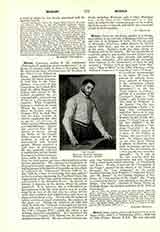
John Morris
Canon, afterwards Jesuit, F.S.A., b. in India, July 4, 1826; d. at Wimbledon, Oct. 22, 1893

Morris, JOHN, canon, afterwards Jesuit, F.S.A., b. in India, July 4, 1826; d. at Wimbledon, October 22, 1893, son of John Carnac Morris, F.R.S. He was educated partly in India, partly at Harrow, partly in reading for Cambridge with Dean Alford, the New Testament scholar. Under him a great change passed over Morris’s ideas. Giving up the thought of taking the law as his profession, he became enthusiastic for ecclesiastical antiquities, took a deep interest in the Tractarian movement, and resolved to become an Anglican clergyman. Going up to Trinity College, Cambridge, in October, 1845, he became the friend, and then the pupil of F. A. Paley, grandson of the well known divine, and already one of the leading Greek scholars of the university. The conversion of Newman, followed by the receptions of so many others, deeply impressed him, and he was reconciled by Bishop Wareing, May 20, 1846. A storm followed, beginning in the “Times”, which made itself felt even in Parliament. Paley had to leave Cambridge (which led to his subsequently joining the Church), while Morris was practically cast off by his family. He then went to the English College, Rome, under Dr. Grant (q.v.), and was there during the revolution of 1848. Soon after the restoration of the English Hierarchy in 1850, he was made Canon of Northampton, and then returned as vice rector to Rome (1853-1856). He now became postulator for the English Martyrs (q.v.), whose cause owes perhaps more to him than to any other person. Returning to England, he took part in the third Synod of Westminster, became secretary to Cardinal Wiseman (q.v.), whom he affectionately nursed on his deathbed, and served under Archbishop Manning (q.v.), until he became a Jesuit in 1867. He taught Church History from 1873-1874; he was Rector of St. Ignatius’ College, Malta, from 1877-78; master of novices in 1879; and director of the writers of the English Province in 1888. Always remarkable for his ardent affectionate nature, his untiring energy and earnest holiness of life, he was also an excellent scholar, an eloquent speaker, and a high-principled leader of souls. His death befitted his life; for he expired in the pulpit, uttering the words, “Render to God the things that are God‘s.” His principal works are: “The Life and Martyrdom of St. Thomas Becket” (London, 1859 and 1885); “The Life of Father John Gerard” (London, 1881), translated into French, German, Spanish, and Polish; “Troubles of our Catholic Forefathers” (3 vols., London, 1872-1877); “Letterbooks of Sir Amias Poulet” (London, 1874); and many contributions to “The Month”, “The Dublin Review”, “Archiologia”, and other periodicals.
J. H. POLLEN

